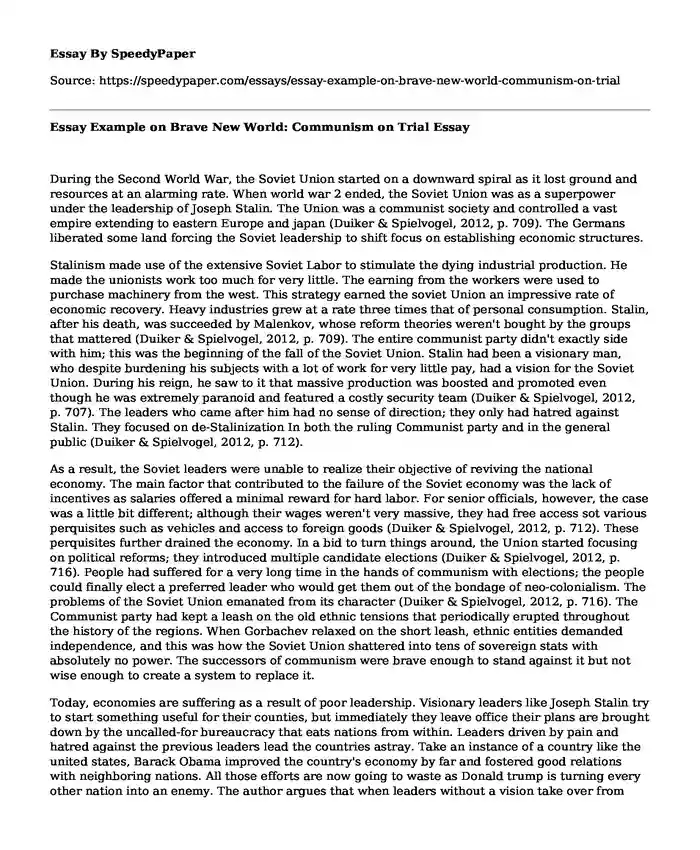
| Type of paper: | Article review |
| Categories: | Leadership analysis Economics Political science Brave New World |
| Pages: | 3 |
| Wordcount: | 666 words |
During the Second World War, the Soviet Union started on a downward spiral as it lost ground and resources at an alarming rate. When world war 2 ended, the Soviet Union was as a superpower under the leadership of Joseph Stalin. The Union was a communist society and controlled a vast empire extending to eastern Europe and japan (Duiker & Spielvogel, 2012, p. 709). The Germans liberated some land forcing the Soviet leadership to shift focus on establishing economic structures.
Stalinism made use of the extensive Soviet Labor to stimulate the dying industrial production. He made the unionists work too much for very little. The earning from the workers were used to purchase machinery from the west. This strategy earned the soviet Union an impressive rate of economic recovery. Heavy industries grew at a rate three times that of personal consumption. Stalin, after his death, was succeeded by Malenkov, whose reform theories weren't bought by the groups that mattered (Duiker & Spielvogel, 2012, p. 709). The entire communist party didn't exactly side with him; this was the beginning of the fall of the Soviet Union. Stalin had been a visionary man, who despite burdening his subjects with a lot of work for very little pay, had a vision for the Soviet Union. During his reign, he saw to it that massive production was boosted and promoted even though he was extremely paranoid and featured a costly security team (Duiker & Spielvogel, 2012, p. 707). The leaders who came after him had no sense of direction; they only had hatred against Stalin. They focused on de-Stalinization In both the ruling Communist party and in the general public (Duiker & Spielvogel, 2012, p. 712).
As a result, the Soviet leaders were unable to realize their objective of reviving the national economy. The main factor that contributed to the failure of the Soviet economy was the lack of incentives as salaries offered a minimal reward for hard labor. For senior officials, however, the case was a little bit different; although their wages weren't very massive, they had free access sot various perquisites such as vehicles and access to foreign goods (Duiker & Spielvogel, 2012, p. 712). These perquisites further drained the economy. In a bid to turn things around, the Union started focusing on political reforms; they introduced multiple candidate elections (Duiker & Spielvogel, 2012, p. 716). People had suffered for a very long time in the hands of communism with elections; the people could finally elect a preferred leader who would get them out of the bondage of neo-colonialism. The problems of the Soviet Union emanated from its character (Duiker & Spielvogel, 2012, p. 716). The Communist party had kept a leash on the old ethnic tensions that periodically erupted throughout the history of the regions. When Gorbachev relaxed on the short leash, ethnic entities demanded independence, and this was how the Soviet Union shattered into tens of sovereign stats with absolutely no power. The successors of communism were brave enough to stand against it but not wise enough to create a system to replace it.
Today, economies are suffering as a result of poor leadership. Visionary leaders like Joseph Stalin try to start something useful for their counties, but immediately they leave office their plans are brought down by the uncalled-for bureaucracy that eats nations from within. Leaders driven by pain and hatred against the previous leaders lead the countries astray. Take an instance of a country like the united states, Barack Obama improved the country's economy by far and fostered good relations with neighboring nations. All those efforts are now going to waste as Donald trump is turning every other nation into an enemy. The author argues that when leaders without a vision take over from those with an idea, they kill the views and the development plan. This killing of ideas is the same trend seen after the death of Joseph Stalin; his successors never connected to his vision for the Soviet Union.
References
Duiker, W. J., & Spielvogel, J. J. (2012). The Essential World History, Volume II: Since 1500. Nelson Education.
Cite this page
Essay Example on Brave New World: Communism on Trial. (2022, Dec 26). Retrieved from https://speedypaper.com/essays/essay-example-on-brave-new-world-communism-on-trial
Request Removal
If you are the original author of this essay and no longer wish to have it published on the SpeedyPaper website, please click below to request its removal:
- Essay Example on Criteria Matrix and Alternatives about Groundwater Sustainability Program
- Essay Example: Ethical Issues in Automotive Engineering
- Part 1: Introduction, thesis statement, research objectives, and hypotheses.
- Free Essay Sample on Animal Communication
- Free Essay: Politics, Political Science and Government
- Literary Essay Sample: Characters Analysis of Anders from Bullet to the Brain
- Free Essay. Media Semiotic Analysis with Embedded Research
Popular categories




